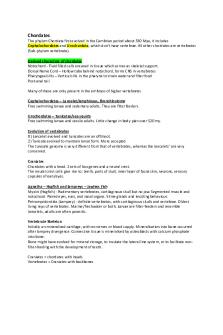(12) Mistake - Lecture notes 12 PDF

| Title | (12) Mistake - Lecture notes 12 |
|---|---|
| Course | Contract Law |
| Institution | Cardiff University |
| Pages | 8 |
| File Size | 135.9 KB |
| File Type | |
| Total Downloads | 90 |
| Total Views | 181 |
Summary
Mistake...
Description
Sunday, 7 February 2021
Lecture 12 Mistake! Circumstances may hold an otherwise valid contract to be deemed as coming to an end, without any fault to either party. Drastic decision, for that to occur there has to be a very high threshold. ! Mistake and frustration are limited doctrines. !
WHAT IS MEANT BY ‘MISTAKE’?! •
Something so fundamental to the contract apparently agreed that the court considers the parties should no longer be held to their bargain.!
•
Limited doctrine - where a mistake is operative the outcome is that the contract will be brought to an end.!
Directions sets mistakes out into 2 broad categories: ! (1) “Communication mistakes” - when one party to the contract is mistaken as the identity of the other party, case of mistaken identity, Shogun Finance v Hudson.! (2) “Common mistakes of fundamental fact(s)”, both parties are mistaken as to the fact and the mistake is unilateral, Bell v Lever Bros and The Great Peace.
EFFECTS OF A MISTAKE:! •
In the limited cases where the doctrine of mistake operates it usually makes the contract void, there is no contract and the law takes the view there never has been one. !
•
Consider the position in a contract for the sale of goods - if void, then title (ownership) for the goods can never pass between the seller and buyer. Original seller entitled to return of his goods, even if the buyer has sold them to a 3rd party.!
•
Void and voidable contracts are two different things, voidable means a contract exists and is valid until innocent party takes action to set aside / rescind by one of the parties.!
1
Sunday, 7 February 2021 •
Here title does pass to the buyer, if a buyer sells on to a 3rd party before the original contract set aside, 3rd party is protected.
TYPES OF MISTAKE: (1) COMMUNICATION MISTAKES! •
Common type: “unilateral mistakes”, i.e. where one of the parties has made a mistake as to the intentions or identity of the other party but the other part knows the mistake or ought to know of it, e.g. A pretends to be B, a famous actor, in order to gain a contractional offer from C. !
•
Court must first establish the terms of the apparent objective contract prior to deciding if a party has made a mistake when communicating their subjective intentions: Smith v Hughes (1871). !
Communication Mistakes - Mistaken Identity ! •
Often involves a fraudster, fraudulently misrepresenting their identity to the owner. If contract is voidable, the timing of rescission by A is vital: !
A (seller) ! ! B (fraudster)$ $
$
C (third party) !
The fraudster then disappears and the seller looks to the innocent third party to claim from them.! If the seller succeeds in demonstrating the contract between the seller and fraudster is void due to mistaken identity then there has never been a contract in the first place, title of goods did not pass. ! Seller can claim goods back from the third party as title of goods did not pass.!
If the seller cannot demonstrate the contract is void, the contract will be voidable due to the misrepresentation by the fraudster. Rescission may be available but title has passed to the third party. ! If A delays ability to rescind contract with B by the time goods have past to C, will not be able to recover goods because cannot recover against a third party.!
2
Sunday, 7 February 2021 A number of presumptions depending upon e.g. whether the contract made face to face or at a distance. ! •
Face to Face : law presumes the seller intends to contract with the actual person who is buying. Contract voidable for misrepresentation, Phillips v Brooks Ltd (1919) and Lewis and Averay (1971). !
•
However, contrast with the case of Ingram v Little (1960) where the presumption is rebutted. !
•
Written Contracts: a contract in writing is presumed to be between the two parties identified in the writing: Cundy v Lindsay (1878).!
- Rogue offers to buy handkerchiefs from Lindsay! - Offer in correspondence purports to be on behalf of a company, not the rogue. Lindsay accepts offer.!
- Rogue sells to Cundy. ! - HoL held the contract was void. Title did not pass to rogue or Cundy. Lindsay did not intend to contract with Rogue and none of the correspondence had Rogue’s name on. ! •
Similar fraud in King’s Norton Metal, but contract was held voidable not void. !
•
Somewhat artificial presumptions. !
Shogun Finance Ltd v Hudson [2004] 1 AC 919 (HL): ! •
Car hire purchase agreement for a Mitsubishi shogun. !
•
Crook visited the dealership, pretended to be someone from Leicester, used a stolen driving license as identity. Forged signature on a fax to confirm agreement. !
•
10% deposit paid by both cash and cheque. !
•
Cheque dishonoured, car resold to a third party, Mr Hudson, for £17,000 and he bought it in good faith. !
•
Crook dishonoured hire purchase and went missing. !
•
In Shogun there was a 3/2 split between Lords, minority favoured changing the law: Lord Nicholls, not satisfied that there should be different rules according to the mechanism of contracting and thinks there should be one rule to answer all cases of mistaken identity.!
3
Sunday, 7 February 2021 •
Policy Analysis: “As between two innocent parties, the loss is more appropriately borne by the person who takes the risks inherent in parting with his goods without receiving payment”. !
•
Lord Nicholls is favouring the rule in Phillips v Brooks - voidable rather than void.!
•
In Shogun, the majority: Lord Hobhouse and Walker, disagreed with Nicholls, stated there needed to be a division between these presumptions. Identity viewed as critical in hire purchase credit agreements. Critical of the reform agenda proposed by Nicholls. !
•
Written documents specifying parties, therefore no contract formed with the Crook. Upheld the decision in Cundy v Lindsay, much more protective and pragmatic. Contract void.!
•
Lord Philip resolved the 2:2 split but upholding the existing rules. Title to the vehicle had never left Shogun. !
Ingram v Little [1961] 1 QB 31:! •
Proportionality and technical distinctions. !
•
“The plain answer is that the loss should be divided between them in such proportion as is just in all the circumstances. If it be pure misfortune, the loss should be borne equally; if fault or imprudence of either party has caused or contributed to the loss, it should be borne by that party in the whole or in the greater part”. LJ Devlin.!
•
Law Reform (Frustrated Contracts) Act 1943. !
Statutory Intervention? ! Law Reform Committee “The Transfer of Title to Chattels” (1966) (Cmnd 2958) Paras 9-12 and 15. ! Rejected proposals as unworkable, reason given was it would offer the courts too much discretion. !
4
Sunday, 7 February 2021 TYPES OF MISTAKE: (2) COMMON MISTAKE OF FUNDAMENTAL FACTS! •
If parties enter into a contract under a fundamental common mistake and this makes performance of the contract in accordance with its terms impossible, contract will be void at common law for mistake. !
•
Linked to but not the same as frustration or subsequent impossibility (where the event occurs AFTER the formation of the contract). !
Contractual Allocation of Risk:! •
What is the relationship between the express and implied terms of the contract and the doctrine of common mistake? !
•
Has either party promised that the circumstances in question will be true, or has neither party undertaken that risk?!
•
See McCrae v Commonwealth Disposals Commission (1950) On the construction of the contract their was an implied promise, sellers were in breach of contract rather than the parties operating under the mistake. !
Common Mistake of Facts:! •
Mistake as to existence of the subject matter - e.g. Couturier v Hastie
•
Mistake as to title - significant to constitute common mistake e.g. Cooper v Phibbs
•
Mistakes as to quality - e.g. Bell v Lever Bros
Bell v Lever Bros [1931] All ER 1: ! •
Two employees of Lever Bros, acting as chairman and vice-chairman of subsidiary company.!
•
LB wants to end employment of employees, subsidiary. !
•
Offered a binding contractual settlement to both employees. !
•
Employees accepted the agreement. !
•
LB discover that employees had been trading on own account, and could have terminated contract without compensation. !
5
Sunday, 7 February 2021 •
Is the settlement binding? Not sufficiently fundamental a mistake to vender the contract void. !
•
Assumption that both patties assumed that employees were entitled to compensation at time settlement agreed. !
•
What types of mistake will require judicial intervention?!
•
What remedies will be granted? !
Per Lord Atkin:! •
Substantive test:!
•
Accepts that mistake as to identity and existence of subject matter can be sufficiently fundamental. !
•
Also recognises mistake as to title, in reliance on Cooper v Phibbs.
•
“Mistake as to the quality of the thing contracted for raises more difficult questions. In such a case a mistake will not affect assent unless it is the mistake of both parties, and is as to the existence of some quality which makes the thing without the quality essentially different from the thing as it was believed to be”. !
•
Compare the things as to the real world and what the parties thought it would be and it has to be sufficiently different. High threshold to satisfy this. !
•
Examples of an ‘essential difference in quality’, but only gives negative examples. Hard test to satisfy. !
•
If the test is satisfied, contract is void ab initio.
•
No binding agreement. !
•
Return parties to pre-contract position. !
•
Very high threshold to meet before common mistake will be operative. Not clear what will satisfy the test. If test met, the result is rigid - “remedial inflexibility”. !
The Role of Equity - Solle v Butcher [1949] 2 All ER 1107 (CA):! •
House converted into flats. !
•
Flat let at £250 p.a. for 7 years. !
•
Both parties believed flat to be outside rent control legislation (Rent Restriction Acts) and therefore not bound by prior rent of £140 p.a. !
6
Sunday, 7 February 2021 •
Flat was covered by rent legislation. !
•
Effect of common mistake as to legal position? !
Two kinds of mistake per Lord Denning: ! (i) Common law, as per Bell v Lever Bros. Held: not applicable on the facts.! (ii) Equity, “A contract is also liable in equity to be set aside if the parties were under a common misapprehension either as to facts or as to their relative and respective rights, provided that the misapprehension was fundamental and the party seeking to set it aside was himself not at fault”. Fall back doctrine of common mistake in equity. !
Solle - Problems! •
How is Denning’s “fundamental” test for equity different from Lord Atkin’s ‘essentially different’ test at common law?!
•
What remedy for common mistake in equity? Equitable so can set aside “on terms” i.e. on conditions set by the court because equity is discretionary; the effect on the contract is different and unpredictable although the flexibility may allow justice. !
•
Terms in Solle? New lease at an appropriate rate. At common law, would have said there was never a binding contract.!
Great Peace Shipping Ltd v Tsavliris Salvage (Int’l) Ltd, The Great Peace [2003] QB 679! •
Vessel damaged in Indian Ocean.!
•
Needs salvage support and evacuation of crew.!
•
Nearest vessel is believed to be The Great Peace. Chartered to assist.!
•
Estimated at 35 miles apart, actually 410 miles apart. Wish to cancel chaterparty contract on grounds of common mistake. !
•
Lord Phillips MR at [126] “It was not realistic to treat the House of Lords in Bell v Lever Bros Ltd as oblivious to principles of equity, nor to suggest that ‘if it had been considered on equitable grounds the result might have been different’”. !
7
Sunday, 7 February 2021 •
Held: Solle v Butcher not good law due to rules of precedent. Does not disagree with principle of what CoA was trying to achieve in Solle.
•
Phillips is saying it would be better for the courts to have greater flexibility than a doctrine at common law which holds the contract void in such circumstances.!
•
He says, “Just as the Law Reform (Frustrated Contracts) Act 1943 was needed to temper the effect of the common law doctrine of frustration, so there is scope for legislation to give greater flexibility to our law of mistake than the common law allows”. !
If a problem question in exam, apply the ‘essentially different’ test as set out in Bell v Lever Bros.
8...
Similar Free PDFs
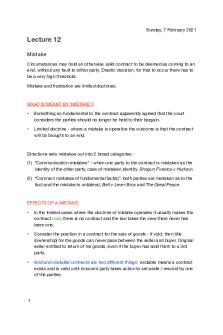
(12) Mistake - Lecture notes 12
- 8 Pages
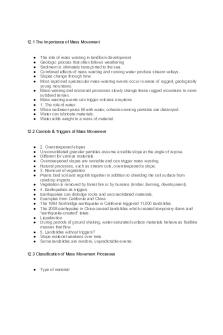
12 - Lecture notes 12
- 3 Pages
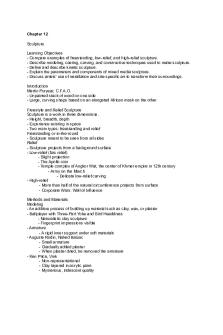
Chapter 12 - Lecture notes 12
- 4 Pages

Lab 12 - Lecture notes 12
- 5 Pages
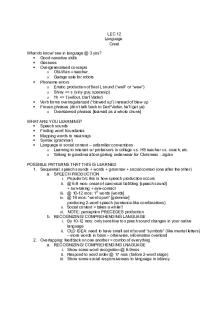
LEC 12 - Lecture notes 12
- 3 Pages

Chapter 12 - Lecture notes 12
- 9 Pages
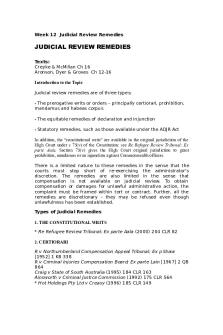
Lecture notes, lecture 12
- 9 Pages

Lecture notes, lecture 12
- 7 Pages

Sachvui - Lecture notes 12
- 271 Pages

Mujadid - Lecture notes 12
- 1 Pages

Lecture 11 + 12 notes
- 16 Pages
Popular Institutions
- Tinajero National High School - Annex
- Politeknik Caltex Riau
- Yokohama City University
- SGT University
- University of Al-Qadisiyah
- Divine Word College of Vigan
- Techniek College Rotterdam
- Universidade de Santiago
- Universiti Teknologi MARA Cawangan Johor Kampus Pasir Gudang
- Poltekkes Kemenkes Yogyakarta
- Baguio City National High School
- Colegio san marcos
- preparatoria uno
- Centro de Bachillerato Tecnológico Industrial y de Servicios No. 107
- Dalian Maritime University
- Quang Trung Secondary School
- Colegio Tecnológico en Informática
- Corporación Regional de Educación Superior
- Grupo CEDVA
- Dar Al Uloom University
- Centro de Estudios Preuniversitarios de la Universidad Nacional de Ingeniería
- 上智大学
- Aakash International School, Nuna Majara
- San Felipe Neri Catholic School
- Kang Chiao International School - New Taipei City
- Misamis Occidental National High School
- Institución Educativa Escuela Normal Juan Ladrilleros
- Kolehiyo ng Pantukan
- Batanes State College
- Instituto Continental
- Sekolah Menengah Kejuruan Kesehatan Kaltara (Tarakan)
- Colegio de La Inmaculada Concepcion - Cebu

